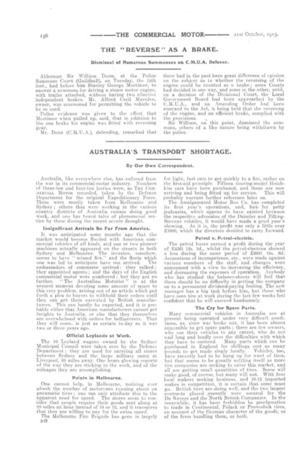AUSTRALIA'S TRANSPORT SHORTAGE.
Page 16

If you've noticed an error in this article please click here to report it so we can fix it.
By Our Own Correspondent.
Australia, like everywhere else, has suffered from the war in its commercial-motor industry. Numbers of three-ton and four-ton lorries were, as THE COMMERCIAL MOTOR recorded, taken by the Defence Department for the original Expeditionary Force. These were mostly taken from Melbourne and Sydney ; others that Were working in the various country districts of Australia remain doing good work, and one has heard tales of phenomenal service by these during the recent severe drought.
Insignificant Arrivals So Far From America.
It was anticipated some months ago that the market would become flooded with American commercial vehicles of all kinds, and one or two pioneer machines actually appeared on the streets in both Sydney and Melbourne. The invasion, somehow, seems to have " missed fire," and the fleets which one was led to anticipate have. not. arrived. The • ambassadors of commerce -arrived: they talked ; they appointed agents; and the days of the English commercial motor were numbered; but they got no further. "The. Australia.n Motorist " is at the present moment devoting some amount of space to this very problem, arising out of an article which put forth a plea to buyers to withhold their orders until they can get them executed by British manufacturers. This can hardly be expected, and it is probable either that American manufacturers cannot get freights to Australia, or else that they themselves are overwhelmed with orders for belligerents. That they will come, is just as certain to-day as it was two or three years ago.
Official Leylands at Work.
The 10 Leyland wagons owned by the Sydney Municipal Council were taken over by the Defence Department ; they are used for carrying all stores between Sydney and the large military camp at Liverpool, 20 miles away. One hears glowing reports of the way they are sticking to the work, and of the mileages they are accomplishing.
Points in Melbourne.
One cannot help, in Melbourne, noticing ever afresh the number of motorvans running about on pneumatic tires ; one can only attribute this to the apparent need for speed. The stores ,seem to consider that people require their goods .sent along at 20 miles an hour instead of 10 or 12, and it transpires that they are willing to Day for the extra speed:
The Melbourne Fire Brigade has gone in largely n48 for light, fast cars to get quickly to a fire, rather on the first-aid principle. Fifteen touring-model Hotchkiss cars have been purchased, and these are now arriving and being fitted up for service. This will probably warrant further reference later on. •• The Amalgamated Motor Bus Co. has completed its first year's operations, and, hut o for petty jealousies, which appear to have existed between the respective advocates of the -Daimler. and TillingStevens vehicles, it would, have made a good year's showing. As it is, the profit was only a little over £1000, which the directors decided tOcarry forward.
Petrol v. Ptrolmelectric.
The petrol buses earned a profit during the year of £4361 12s. 3d., whilst the petrol-electrics showed a loss during the same period of 22931 15s.. 6d. Accusations of incompetence, etc., were made against various members of the staff, and changes were announced 'with a view, to increasing the and decreasing the expenses of operation. Anybody who has studied the balance-sheets will feel that there should be no difficulty in getting the company on to a permanent dividend-paying footing. The new manager has a big task before him, but those who have seen him at work during the last few weeks feel confident that he will succeed handsomely.
The Cry for Spare Parts.
Many commercial vehicles in Australia, are at present being operated under very difficult conditions, as, since war broke out, it has been almost impossible to get spare parts; there are few owners, who use their vehicles to any extent, who do not wail long and loudly over the difficulties with which they have to contend. Many parts which can be purchased in England for shillings cost as many pounds to get made singly locally. Vehicles, too, have recently had to be hung up for want. of tires, but that seems to be greatly settling itself as more tire companies are seeking to enter this market, and all are getting small quantities of tires. Some will make good, of course, but many will not. With four local makers seeking business, and 10-12 imported makes in competition, it is certain, that. some must go. British tires are doing well, and the two largest contracts placed gecently were secured for the Be Nevers and the North British Companies. In the meanwhile, it has been forbidden by proclamation to trade in Continental, Polack or Prowodnik tires, on account of the German character of the goods, or of the firms handling them, or both.




















